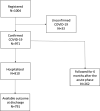Short- and long-term outcome and predictors in an international cohort of patients with neuro-COVID-19
- PMID: 35194889
- PMCID: PMC9111799
- DOI: 10.1111/ene.15293
Short- and long-term outcome and predictors in an international cohort of patients with neuro-COVID-19
Abstract
Background and purpose: Despite the increasing number of reports on the spectrum of neurological manifestations of COVID-19 (neuro-COVID), few studies have assessed short- and long-term outcome of the disease.
Methods: This is a cohort study enrolling adult patients with neuro-COVID seen in neurological consultation. Data were collected prospectively or retrospectively in the European Academy of Neurology NEuro-covid ReGistrY ((ENERGY). The outcome at discharge was measured using the modified Rankin Scale and defined as 'stable/improved' if the modified Rankin Scale score was equal to or lower than the pre-morbid score, 'worse' if the score was higher than the pre-morbid score. Status at 6 months was also recorded. Demographic and clinical variables were assessed as predictors of outcome at discharge and 6 months.
Results: From July 2020 to March 2021, 971 patients from 19 countries were included. 810 (83.4%) were hospitalized. 432 (53.3%) were discharged with worse functional status. Older age, stupor/coma, stroke and intensive care unit (ICU) admission were predictors of worse outcome at discharge. 132 (16.3%) died in hospital. Older age, cancer, cardiovascular complications, refractory shock, stupor/coma and ICU admission were associated with death. 262 were followed for 6 months. Acute stroke or ataxia, ICU admission and degree of functional impairment at discharge were predictors of worse outcome. 65/221 hospitalized patients (29.4%) and 10/32 non-hospitalized patients (24.4%) experienced persisting neurological symptoms/signs. 10/262 patients (3.8%) developed new neurological complaints during the 6 months of follow-up.
Conclusions: Neuro-COVID is a severe disease associated with worse functional status at discharge, particularly in older subjects and those with comorbidities and acute complications of infection.
Keywords: COVID-19; SARS-CoV-2; neurological disorders; outcome; predictors.
© 2022 European Academy of Neurology.
Conflict of interest statement
Dr Beghi reports grants from the Italian Ministry of Health, grants from SOBI, personal fees from Arvelle Therapeutics, grants from American ALS Association, outside the submitted work. Dr Moro reports personal fees from Medtronic, personal fees from Abbott, grants from Boston, outside the submitted work. Dr Cavallieri reports personal fees from Zambon, outside the submitted work. Dr Kiteva‐Trenchevska reports personal fees from Roche, personal fees from Pliva, personal fees from Medis, outside the submitted work. Dr Aamodt reports research grants outside the submitted work from Medtronic and Boehringer Ingelheim and personal fees outside the submitted work from Bayer, Boehringer Ingelheim, Roche, Allergan, Novartis and Teva. Dr von Oertzen reports personal fees from Liva Nova, grants from Merck, personal fees from Indivior Austria GmbH, personal fees and non‐financial support from gtec GmbH Austria, grants, personal fees and non‐financial support from Boehringer Ingelheim, personal fees from Philips, personal fees from UCB Pharma, personal fees from Almirall, grants and personal feees from Eisai, personal fees from Arvelle Therapeuticos, personal fees from GW Pharma, personal fees from Zogenix GmbH, personal fees from Angelini Pharma Österreiche, personal fees from Novartis Pharma GmbH, outside the submitted work; and he is co‐chair of the Communication Committee, scientific panel for epilepsy, and COVID taskforce, all of the European Academy of Neurology, president of the Österreichische Gesellschaft für Epileptologie (Austrian ILAE chapter) and president of the upper Austrian MS society. The other authors have nothing to disclose.
Figures
References
Publication types
MeSH terms
LinkOut - more resources
Full Text Sources
Medical
Miscellaneous



